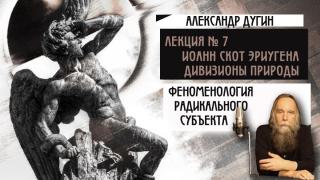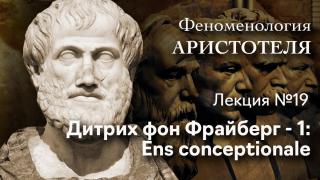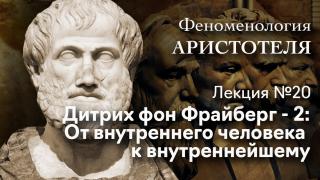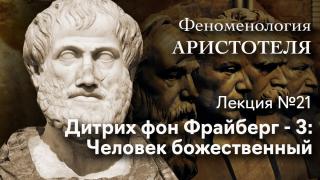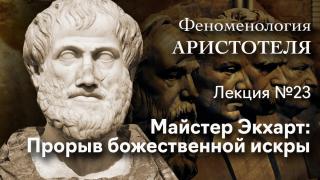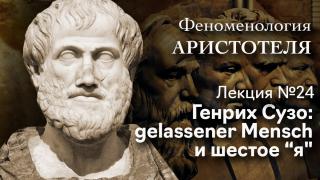- Главная
- Рейнские мистики (Дитрих Тевтоникус, Экхарт, Сузо, Таулер)
Рейнские мистики (Дитрих Тевтоникус, Экхарт, Сузо, Таулер)
Слушать аудио
Смотреть видео
-
Феноменология Радикального Субъекта. Лекция 7. Иоанн Скот Эриугена: дивизионы Природы
Geschaffene Natur / ewige Natur. Жизнь. Карл Лысый. Эриугена (ок. 810—877).
Natura. Περί φύσεων μερίσμου. Peri physeon. De divisione naturae или Periphyseon μερίσμου.
Тотальность Всего. Граница Creator (increatum) / creatum. donum / datum.
Четыре деления divisio / specie Naturae.
Бог - предшествующий бытию creans et non creatum (negatio omnium) nihil per excellentiam
Идеи – София creans et creatum πρωτότυπα /προορίσματα/ ἰδέαι/ θεΐα θελήματαАнгел / Человек как Imago
Вещи – creatum et non creans
Ничто – non creatum et non creans
reditus. nihil per privationem ?
Движение Бога
God moves from Himself in Himself towards Himself.
Движение
- Motion is a natural power hastening towards its end
- Motion is a passion coming from one to another, ot which the end is impassibility
- Motion is an active operation, of which the end is self-perfectionЭкзистенция но не субстанция Бога
Бог знает, что Он есть , не знает Чтó Он есть
God knows [of Himself] what He is, does He not define Himself— for everything which is understood by itself or by another as to what it is can be defined.
Григорий Назианзин
So God does not know of Himself what He is because He is not a “what”, being in everything incomprehensible both to Himself and to every intellect.
Человек знает, что он есть, но не знает чтό он есть.
- Триада Сущность – Сила – Действие
οὐσία δύμανις ἐνέργεια
οὐσία λόγος θελήμα
София
Постоянное в тварном движении
in all things whatever is rightly understood to be is nothing else but the manifold power of the creative Wisdom which subsists in all things.
if in your mind you take away the creative Wisdom from all things which it creates they will be reduced to nothing
В Мудрости Божией все вещи и вечные и созданы
Ангелы
Созерцание нетварных логосов
the Cause of all things is inaccessible to all things that are created by it, then there
can be no doubt but that the reasons of all things, which exist [in it] eternally and without change, are completely inaccessible to all things of which they are the reasons.
Ангелы как эпифании
In the intellects of the angels there are certain theophanies of those reasons, that is to say, certain [divine] manifestations which are comprehensible to the intellectual nature, but which are not the reasons, i.e. the primary exemplars.
Ангелы смотрят над собой, в себя и под собой.
Ангелы как движение
The celestial essences, which the Divine Oracles also call the celestial and angelic powers, are substantially nothing else but intelligible, eternal
[and] unceasing motions about the Beginning of all things for they understand that they are from Him and that their intellect moves through Him and in Him, and they know for certain that they have no other end than Him],
Апофатический человек
Imago
Григорий Нисский
Человек не познаваем как Imago
Об устроении человека
Ум как единство всех типов восприятия
Кто разумѣ умъ Господень? говоритъ Аностолъ (Рим. 11, 34.). А я присовокуплю къ этому : кто уразумѣ ообственный свой умъ?
Такъ какъ однимъ изъ свойствъ, усматриваемыѵь въ Божіемъ естествѣ, есть неностижимость сущности: то по всей необходимости и образъ въ этомъ имѣетъ сходство съ Первообразомъ. Если бы естество образа оказалось постижимымъ, а первообразъ былъ выше постиженія; то сія противоположность усматриваемыхъ свойствъ обличила бы погрѣшительность образа. Но какъ не подлежитъ познанію естество нашего ума, созданнаго но образу Сотворшаго: то имѣетъ онъ точное сходство съ превыше-Сущимъ , непознаваемостию своею отличая непостижимое свое естество.
Бог знает, что Он есть, но не знает Чтό Он есть.
Связь visio beatifica и Мельхисидека
Мельхисидек вне времени (нет отца и матери)
Visio beatifica погружение в созерцание предтварных логосов
Отсюда опыт видения всего мира в целом: из-за пределом пространства и времени только и можно увидеть пространство и врмея
Движение человека
Душа есть движение
For the essential being of the soul is not other than her substantial motion. For the soul subsists in her motions and her motions subsist in her. For she is by nature simple and indivisible, and is differentiated only by the substantial differences of her motions.
Первое движение души
the motion of the soul which (…) illumined by knowledge, perfected by the divine word, by which she eternally revolves about the unknown God is called voùç by the Greeks but by our writers intellectus or animus or mens.
it exists substantially, and is understood to be the principal part of the soul.
Второе движение души
The second motion of the soul, as we have said, is that which is contained within the bounds of its nature and defines the Very God as Cause, that is, it knows only this about the God Who is unknown as to what He is, (namely), that He is the Cause of all things that are, and that the primordial causes of all (things) are eternally created by Him and in Him .
Под душой φαντασίαι
Над душой θεοφάνειαι / divinae aparitiones
Это движение души есть λόγος или δύναμις или ratio virtus
Разум пред-знает и пред-создает вещи
Разум форма интеллекта
Третье движение души
Διάνοια ἐνέργεια operatio
Проекция единства формы как причины в рацио во вне – через фантазии и чувства
Люди
what is to prevent us from understanding in a similar way that human intellects unceasingly revolve about God, seeing that they are from Him and through Him and in Him and for Him [for they revolve in the same intelligible circle].
В движении человека открывается движение Бога
Тело создано душой
Первое тело было создано чистой душой в раю
Второе тело создано и созидается душой непрерывно и сейчас
But I do not hesitate to say that this corruptible and material body which was taken from the mud of the earth after sin and as a punishment for sin, was created and is daily being created as though by some proper action of the soul.
the soul is the image of God, the body the image of the soul this mortal body attached to the soul after it had sinned, which is called also an image of an image < as we have often said> . For as God created the soul in His image, so the soul makes the body as a kind of instrument somehow similar to herself.
Тело воскресения
That first incorruptible body which would have remained attached to the soul if she had not sinned, where is it now? For what is incorruptible cannot perish.”
To this there is a short answer : Until now it lies hidden in the secret recesses of human nature, but in the age to come it will appear when
this mortal (body) will be changed into it, and “this corruption will put on incorruption”.
то, без чего не
ων ἄνευ
5 модусов Esse Non Esse
Схватываемое интеллектом и чувствами (есть) – не схватываемое интеллектом и чувствами (не есть) nihil per excellentiam
- Иерархический модус – принадлежащие градусу есть, не принадлежащее градусу не есть (affirmatio enim hominis negatio est angeli, negatio vero hominis affirmatio est angeli)
- Потенциальное и актуальное – актуальное из причины есть, потенциальное в причине не есть
- Идеи есть вещи не есть
- Осененные благодатью есть пораженные грехом не есть
есть
не есть
1
воспринимаемое (умом или чувствами) 2 и 3
не воспринимаемое (умом или чувствами) 1 и 4
2
данный градус бытия
высший и низший градус бытия в отношении к данному
3
действительно извлеченное из причины
потенциально находящееся в причине
4
идеи 2
вещи 3
5
осененные благодатью (праведники)
сраженные грехом
(грешники)
Категории
essentia / quidditas
οὐσία / τὸ τί ἦν εἶναι
quantitas
τὸ πόσον
qualitas
τὸ πόιον
ad aliquid
τὸ πρὸς τί
situs
κεῖσθαι
habitus
ἔχειν
locus
ποῦ
tempus
πότε
agere
ποιεῖν
pati
πάσχειν
Категории не применимы к Богу
Движение / покой
κίνησις / στάσις
πᾶν
усия, отношение, время, место, действие, страдание не материальны (не чувственны)
качество/количество/отношение/ габитус (кондиция) конституируют матери
Не разложимость форм
Формы не разложимы на всех трех уровнях
Род, вид, особь
Материя полностью разложима
Форма есть семя воскресения и точка рая
Горький ад
Не Inferno
Α ἡδύς
Отлучение 1225
It was condemned by a council at Sens by Honorius III (1225),
Собор в Сансе
Влияние на братьев свободного духа
Братья Свободного духа
Давид Динантский David of Dinant (c. 1160 – c. 1217) De Tomis, seu Divisionibus Quaternuli
Амальрик из Бена или Амальрик Шартрский Amaury de Bène середина XII века — между 1205 и 1207
Ortlieb of Strasbourg начало 13 века
Бегинки/беггарды
council in 1210. The Council was headed by Peter of Corbeil, the Bishop of Sens, and ordered the body of Amalric of Chartres to be disinterred and burned, David's writings to be burned, and forbade reading Aristotle's works on natural philosophy
-
Феноменология Аристотеля. Лекция 19. Дитрих фон Фрайберг - 1. Ens conceptionale
Феноменология Аристотеля. Лекция 19. Дитрих фон Фрайберг - 1. Ens conceptionabile
Введение в тему:
- Лекция начинается с введения в фигуру Дитриха фон Фрайберга, доминиканского монаха и философа XIII века, который развивал идеи Аристотеля в контексте метафизики и теории познания. Затем вводится термин "ens conceptionabile" (возможно, понимаемое сущее), что указывает на исследование того, как мы понимаем бытие через концепции.
Аристотель и метафизика:
- Аристотелевская онтология: Обсуждение аристотелевского понимания бытия (ousia), разделяя его на сущее как таковое и сущее в потенции, и как это соотносится с концепцией "ens conceptionabile".
- Познание и бытие: Анализ того, как Аристотель видел процесс познания, где ум (nous) активирует потенциальное знание, превращая его в актуальное понимание сущего.
Дитрих фон Фрайберг и "ens conceptionabile":
- Концепция "ens conceptionabile": Исследование идеи Дитриха о том, что бытие может быть понято через концепции, которые мы формируем в нашем уме. Это предполагает, что наше понимание реальности зависит от нашей способности концептуализировать, от наших ментальных конструкций.
- Метафизика и эпистемология: Обсуждение того, как Дитрих пытается соединить метафизические вопросы о природе бытия с эпистемологическими вопросами о том, как мы знаем это бытие. "Ens conceptionabile" может быть видено как мост между этими двумя областями, где бытие становится доступным через концептуальное понимание.
Феноменологический подход:
- Феноменология и концепции: Рассмотрение, как феноменология, с ее акцентом на непосредственное переживание явлений, может быть использована для понимания концептуализации бытия. Здесь поднимается вопрос о том, как наше сознание формирует и понимает реальность через концепции.
- Интенциональность и концепция: Анализ интенциональности сознания, где каждый акт восприятия или мышления направлен на что-то, в контексте формирования и понимания концепций.
Современные интерпретации и значение:
- Влияние на последующую философию: Обсуждение, как идеи Дитриха фон Фрайберга могли повлиять на развитие философии, особенно в контексте средневековой схоластики и перехода к современным философским методам.
- Применение в современной философии: Возможно, рассмотрение, как концепция "ens conceptionabile" может быть применена в современных дискуссиях о природе знания, восприятия и реальности, где акцент делается на взаимодействие между субъектом и объектом познания.
Заключение:
- Лекция может завершиться подчеркиванием важности концептуального понимания для осмысления бытия, предлагая размышления о том, как наши концепции не только отражают мир, но и формируют наше восприятие и взаимодействие с ним.
-
Феноменология Аристотеля. Лекция 20. Дитрих фон Фрайберг - 2. От внутреннего человека к внутреннейшему
Феноменология Аристотеля. Лекция 20. Дитрих фон Фрайберг - 2. От внутреннего человека к внутреннейшему
Введение в тему:
- Лекция продолжает исследование идей Дитриха фон Фрайберга, сосредотачиваясь на переходе от внутреннего человека (возможно, от внутреннего, духовного или интеллектуального аспекта человека) к чему-то большему или иному, что не указано в названии, но может быть связано с внешним миром, божественностью или высшей формой познания.
Дитрих фон Фрайберг и внутренний человек:
- Концепция внутреннего человека: Обсуждение, как Дитрих развивает идеи о внутреннем человеке, где это может быть связано с интеллектом, душой или духом в контексте аристотелевской психологии и метафизики.
- Аристотель и душа: Анализ аристотелевского понимания души как формы тела, где разумная часть души (nous) является тем, что делает человека человеком, и как это соотносится с идеей внутреннего человека у Дитриха.
Переход от внутреннего к внешнему:
- Познание и бытие: Исследование, как внутренний человек через познание, мышление и духовную практику стремится к пониманию внешнего мира или божественного. Это может включать обсуждение концепций, таких как интенциональность, где внутреннее сознание направлено на внешние объекты.
- Духовное и материальное: Лекция может рассматривать, как Дитрих видел взаимосвязь между духовным внутренним миром и материальным внешним миром, возможно, через призму аристотелевских категорий формы и материи или через метафизические размышления о том, как человеческий разум взаимодействует с миром.
Феноменологический подход:
- Феноменология и внутренний человек: Рассмотрение, как феноменология может помочь понять переход от внутреннего мира к внешнему через акты сознания, где каждое переживание или понимание является одновременно внутренним и ориентированным наружу.
- Интенциональность и переход: Обсуждение, как интенциональность сознания позволяет нам переходить от внутреннего к внешнему, от субъективного к объективному, исследуя, как мы конституируем мир через наши восприятия и концепции.
Современное значение и интерпретации:
- Применение в философии и психологии: Возможно, лекция затрагивает, как идеи Дитриха могут быть интерпретированы или применены в современных философских и психологических дискуссиях о сознании, самосознании, духовности и познании.
- Мост между эпохами: Анализ, как средневековые философские концепции, как у Дитриха, могут создавать мост между древними идеями Аристотеля и современными феноменологическими исследованиями.
Заключение:
- Лекция может завершиться размышлениями о том, как понимание перехода от внутреннего человека к внешнему миру или божественному освещает вопросы о природе человеческого существования, познания и духовности, подчеркивая необходимость интеграции внутреннего и внешнего во всеобъемлющую философскую систему.
-
Феноменология Аристотеля. Лекция 21. Дитрих фон Фрайберг - 3. Человек божественный
Феноменология Аристотеля. Лекция 21. Дитрих фон Фрайберг - 3. Человек божественный
Введение в тему:
- Лекция продолжает изучение идей Дитриха фон Фрайберга, фокусируясь на концепции "человека божественного", исследуя, как человеческое бытие может быть рассмотрено через призму божественности в контексте аристотелевской философии и феноменологии.
Человек божественный у Дитриха фон Фрайберга:
- Духовное измерение человека: Обсуждение того, как Дитрих видел в человеке божественный потенциал или элемент, который позволяет человеку приобщиться к божественному через разум, дух или интуицию. Это может включать размышления о природе души и интеллекта, соотносящихся с божественным разумом.
- Аристотель о душе и божественности: Анализ, как Аристотель понимал высшую часть души (nous, разум) как стремящуюся к божественному знанию или созерцанию, и как эти идеи могли быть развиты или интерпретированы Дитрихом.
Феноменологический подход к божественности:
- Интенциональность и божественное: Исследование, как через феноменологический анализ можно понять стремление человека к божественному как интенциональное движение сознания, где каждый акт сознания направлен на высшее, на поиск абсолютного смысла или истины.
- Божественное в опыте: Рассмотрение, как феноменология может помочь осмыслить опыт божественного в человеческой жизни, будь то через религиозные практики, мистический опыт или через интеллектуальное стремление к пониманию.
Философское и теологическое измерение:
- Теология разума: Лекция может исследовать, как Дитрих фон Фрайберг и Аристотель рассматривали разум как способ приобщения к божественному, где философия становится путем к богословию, где познание и созерцание являются средствами достижения божественности.
- Соединение философии и религии: Обсуждение, как в средневековой философии, особенно в трудах Дитриха, философия и религия переплетаются, где человек рассматривается не только как рациональное существо, но и как носитель божественного образа.
Современные интерпретации и значение:
- Человек божественный в современной философии: Возможно, лекция затрагивает, как идеи о божественности человека могут быть интерпретированы в контексте современных философских и религиозных дискуссий, например, в контексте философии сознания, эстетики или этики.
- Экзистенциализм и божественность: Исследование, как экзистенциальные философы могли бы анализировать идею "человека божественного" в контексте поиска смысла и аутентичности в жизни.
Заключение:
- Лекция может завершиться размышлениями о том, как концепция "человека божественного" предлагает уникальный взгляд на человеческое бытие, подчеркивая его потенциал к трансцендентности, к пониманию и участию в божественном порядке, что может вдохновлять на поиск высшего смысла и цели в жизни.
-
Феноменология Аристотеля. Лекция 23. Майстер Экхарт. Прорыв божественной искры
Феноменология Аристотеля. Лекция 23. Майстер Экхарт. Прорыв божественной искры
Введение в тему:
- Лекция начинается с введения в фигуру Майстера Экхарта, доминиканского монаха и мистика, чьи учения о "прорыве божественной искры" в человеческой душе представляют собой уникальный синтез христианской мистики и философии. Обсуждается, как это может быть исследовано через призму аристотелевской феноменологии.
Майстер Экхарт и божественная искра:
- Концепция божественной искры: Объяснение учения Экхарта о том, что в глубине каждой души существует "божественная искра" - частица Бога, которая позволяет человеку достичь единения с божественным через внутреннее молчание и отречение от самости.
- Аристотель о душе: Анализ, как аристотелевская концепция души, особенно ее разумной части (nous), может быть интерпретирована в контексте эрхартовской божественной искры, где познание и любовь к Богу видятся как высшие формы человеческой деятельности.
Феноменологический подход к Экхарту:
- Феноменология мистического опыта: Исследование, как феноменология может помочь понять мистический опыт "прорыва" к божественному, где фокус делается на непосредственное переживание божественного в сознании, на трансцендентальное измерение человеческого бытия.
- Интенциональность и божественная искра: Обсуждение, как интенциональность сознания у Экхарта направлена на божественное, где каждая духовная практика является актом направления души к Богу, к расцвету этой искры.
Соединение философии и мистики:
- Аристотель и мистика: Рассмотрение, как аристотелевское понимание бытия, познания и этики может быть переосмыслено или дополнено мистической философией Экхарта, где философия становится путем к духовному просветлению.
- Практика и теория: Обсуждение, как учение Экхарта о "прорыве" предполагает не только теоретическое понимание, но и практическую духовную работу, где человек стремится к уничтожению эго для достижения божественного единства.
Современное значение и интерпретации:
- Применение в современной духовности: Возможно, лекция затрагивает, как идеи Экхарта могут быть актуальны сегодня, в контексте поиска духовного смысла в современном мире, где "прорыв божественной искры" может быть видением внутреннего преображения.
- Феноменология и религиозный опыт: Анализ, как феноменологический метод может быть использован для исследования религиозного опыта, предлагая новые пути для понимания мистики и духовности в философском ключе.
Заключение:
- Лекция может завершиться размышлениями о том, как учение Майстера Экхарта о "прорыве божественной искры" предлагает уникальный взгляд на возможность человеческого приобщения к божественному, подчеркивая важность внутреннего поиска и трансформации. Это может включать призыв к дальнейшему изучению взаимодействия между философией, мистикой и феноменологией для более глубокого понимания человеческой души и ее стремлений.
-
Феноменология Аристотеля. Лекция 24. Генрих Сузо: gelassener Mensch и шестое "я"
Феноменология Аристотеля. Лекция 24. Генрих Сузо: gelassener Mensch и шестое "я"
Введение в тему:
- Лекция начинается с введения в фигуру Генриха Сузо, доминиканского мистика и ученика Майстера Экхарта, известного своими произведениями, которые подчеркивают путь к Богу через страдание, любовь и покорность. Обсуждение концепции "Гелассенер Mensch" (отпущенный или преданный человек) и "шестого Я" в контексте аристотелевской феноменологии.
Генрих Сузо и Гелассенер Mensch:
- Концепция Гелассенер Mensch: Объяснение, как Сузо описывает идеал человека, который живет в полной отдаче Богу, в состоянии "отпущенности" от мирских забот и в покорности божественной воле. Это может быть соотнесено с аристотелевским идеалом добродетели и счастья через созерцание.
- Аристотель и духовность: Анализ, как аристотелевские идеи о душевном благе и этике могут быть переосмыслены в контексте мистического пути Сузо, где добродетели приобретают духовный аспект, направленный на достижение единства с божественным.
Шестое Я у Сузо:
- Шестое Я: Обсуждение концепции "шестого Я" у Сузо, где он говорит о шести уровнях души, и шестой из них - это высшее состояние единения с Богом, где эго растворяется, и душа становится "Я" в Боге. Это может быть рассмотрено через призму аристотелевской теории души, где высшая функция души - это разум и созерцание.
- Феноменология и мистическое Я: Исследование, как феноменология может помочь понять переход от эго к божественному, где "Я" переживает себя не в изоляции, а в контексте божественного бытия, через интенциональность сознания, направленную на трансцендентное.
Феноменологический подход к Сузо:
- Мистический опыт в феноменологии: Рассмотрение, как феноменология может анализировать мистические опыты, описанные Сузо, сосредотачиваясь на том, как они проявляются в сознании, как они конституируют наше понимание и бытие.
- Сознание и трансцендентность: Обсуждение, как через феноменологический метод мы можем исследовать стремление сознания к божественному, к преодолению своих ограничений, что соответствует идее "шестого Я".
Современные интерпретации и значение:
- Применение в современной духовности: Возможно, лекция затрагивает, как учения Сузо о духовном пути могут быть актуальны в сегодняшнем мире, где поиск внутреннего покоя и единения с высшим становится важным.
- Философия и мистика: Анализ, как философия может взаимодействовать с мистикой, предлагая новые пути для понимания человеческого опыта и бытия.
Заключение:
- Лекция может завершиться размышлениями о том, как концепции Гелассенер Mensch и шестого Я у Сузо предлагают глубокое понимание духовного пути через призму феноменологии и аристотелевской философии, подчеркивая возможность трансформации сознания и достижения высшего состояния бытия.
-
Феноменология Аристотеля. Лекция 25. Иоханнес Таулер: преображение осла и тварная бездна
Феноменология Аристотеля. Лекция 25. Иоханнес Таулер: преображение осла и тварная бездна
Введение в тему:
- Лекция начинается с введения в фигуру Иоганнеса Таулера, доминиканского монаха и мистика, ученика Майстера Экхарта, и его учения о духовном преображении и природе создания (тварности). Обсуждается, как эти идеи могут быть исследованы через призму аристотелевской феноменологии.
Преображение осла у Таулера:
- Метафора "преображения осла": Объяснение того, как Таулер использует образ осла, символизирующего грубость, невежество или низшую природу человека, который через духовное преображение может подняться к божественному. Это может быть соотнесено с аристотелевскими концепциями потенциальности и актуальности, где человек стремится к своему высшему состоянию.
- Аристотель и духовное развитие: Анализ, как аристотелевская философия о развитии души от потенциального к актуальному может быть интерпретирована в контексте мистического пути Таулера, где духовное преображение видится как переход от низшего к высшему.
Тварная бездна:
- Концепция "тварной бездны": Обсуждение, как Таулер видит созданный мир (тварь) как "бездну", где каждое существо, несмотря на свою ограниченность, содержит в себе искру божественного. Это может быть рассмотрено через аристотелевскую онтологию, где каждая вещь стремится к своему telos (цели), в данном случае, к Богу.
- Феноменология и созданное: Рассмотрение, как феноменология может помочь осмыслить опыт тварности, где мир переживается не только как материальное пространство, но и как место, где проявляется божественное через человеческое сознание.
Феноменологический подход к Таулеру:
- Мистический опыт и феноменология: Исследование, как феноменологический метод может быть использован для анализа мистического опыта, описанного Таулером, особенно в контексте переживания божественного в обыденном.
- Интенциональность к божественному: Обсуждение, как через интенциональность сознания человек может направлять свое внимание и существо к божественному, преодолевая свою "ослиную" природу для достижения духовного просветления.
Современные интерпретации и значение:
- Применение в современной духовности: Возможно, лекция затрагивает, как учения Таулера о духовном преображении могут быть актуальны сегодня, предлагая путь внутреннего развития и понимания тварной природы мира.
- Философия и мистика: Анализ, как философское осмысление мистического опыта может обогатить наше понимание человеческого бытия и его стремления к высшему.
Заключение:
- Лекция может завершиться размышлениями о том, как метафоры "преображения осла" и "тварной бездны" у Таулера предлагают уникальный взгляд на духовный путь через призму аристотелевской философии и феноменологии, подчеркивая возможность трансформации и понимания божественного в созданном мире.



